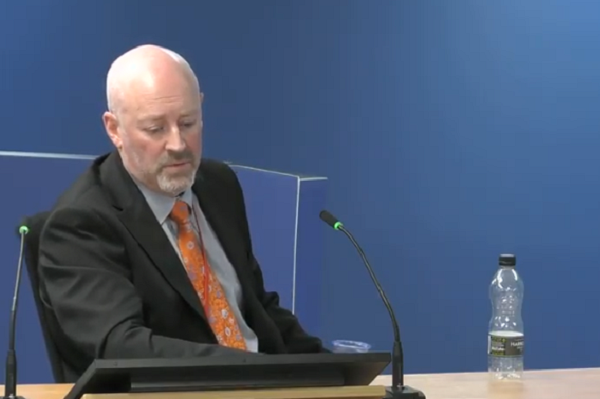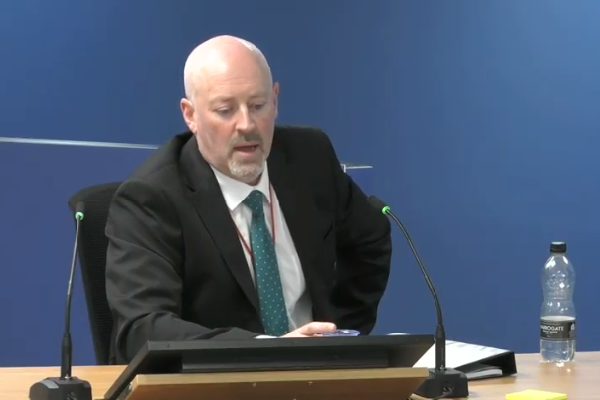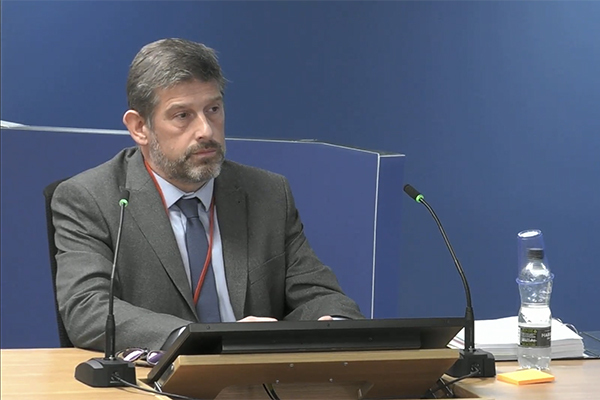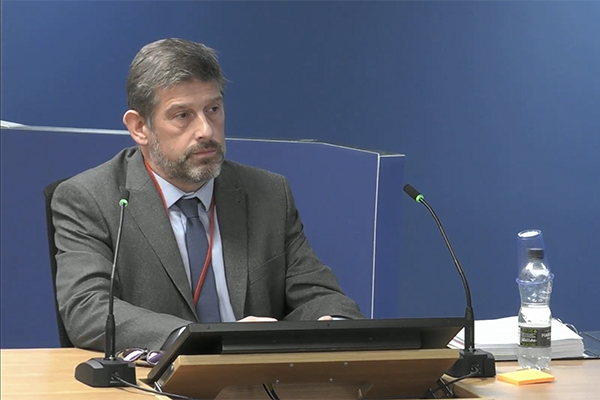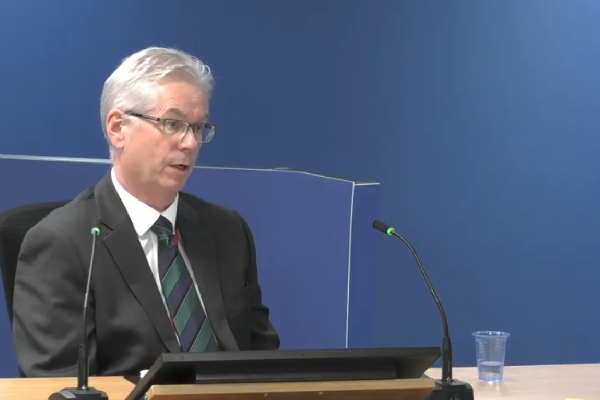Key government official warned over use of Kingspan insulation on high rises in 2014
Government officials were warned in summer 2014 that combustible Kingspan insulation was being used on high rises despite the fact testing did not confirm its safety, emails disclosed by the Grenfell Tower Inquiry today show.
The National House Building Council, a large private building control and warranty provider, warned a key civil servant of its concerns about the use of Kingspan K15 on high-rise buildings.
Brian Martin, the civil servant in charge of the key piece of building guidance Approved Document B, had emailed the firm and said he had recently been warned that combustible plastic insulation was being used in tall buildings and “many of these were blocks of flats”.
This came just days after an industry summit Mr Martin attended where this warning was delivered and he was also warned about the use of combustible aluminium composite material (ACM) cladding. Inside Housing obtained the minutes of this meeting in 2018.
Nothing was done following these warnings to tighten building guidance or warn against the use of these products on high rises.
It was around this time that the decisions on the cladding and insulation materials for Grenfell Tower were finalised. K15 was among the insulation used on its walls.
In the email to Mr Martin, Steve Evans, head of technical operations at the NHBC, wrote: “NHBC approached Kingspan and made them aware of our concerns… There is no reason to suspect that buildings which have been built with Kingspan K15 are at risk at this time, it is just the fact that testing carried out to date does not bear this out.”
He said the firm was planning to “begin the process of informing industry that the product was no longer suitable” for high rises if further testing did not confirm its safety.
The inquiry saw that Kingspan, which had been forwarded the email, responded claiming it had passed two large-scale tests earlier that year.
But this declined to mention that both tests used a new ‘research and development’ product designed to have a superior fire performance, and that one of them had been deemed a failure by testing body the Building Research Establishment (BRE).
“What I’m going to suggest to you is it was a deliberate lie, all of this, it wasn’t just inadvertent, it was a deliberate strategy to deceive not just NHBC and the various professionals but also [the Department for Communities and Local Government] potentially?” asked Kate Grange QC, counsel to the inquiry.
Tony Millichap, former head of technical at Kingspan, denied this and said he believed it was the insulation manufacturer’s intention at the time to switch to selling the trial product it had tested.
The inquiry had previously heard it had commissioned a series of new fire tests of systems incorporating its K15 insulation in late 2013, following concerns raised by the NHBC and facade consultancy Wintech.
Kingspan previously justified the use of the product based on a single test from 2005 which had used an older version of the insulation and a series of certificates from private certification bodies.
It failed a test in January 2014 which it combined its insulation with high-pressure laminate cladding, but commissioned a further test for March.
This time the firm used a new ‘trial product’ which had thicker aluminium foil and was made with a blowing agent that was thought to offer a better performance in fire. This test also failed but more narrowly, and may have passed if conducted under a previous version of the pass/fail criteria.
As a result, Kingspan sought to challenge the BRE, which carried out the test, over its refusal to grant a pass.
In an internal email, Mr Millichap said he would “sow some seeds to influence that result” and if that failed “stronger tactics will be employed”.
The firm then emailed the BRE notifying it of its intention to challenge the results and cc’d its lawyer. The BRE did not back down.
A further test, this time using the trial insulation with terracotta panels, was carried out in July 2014 and it secured a pass.
Internal emails show Kingspan celebrating its pass and resolving to write letters to the industry informing them of its “good news” within 48 hours. But it did not inform anyone that the trial product had been used.
“F*cking happy days,” wrote one team member. “I think we have just pissed over Knauf, Xtratherm and Rockwool [rival insulation companies].”
Asked about the failure to reveal the use of the trial product, Mr Millichap said it may have been “missed or overlooked”.
“Mr Millichap, I would suggest to you this is not something that has been missed or overlooked, this was absolutely deliberate by Kingspan, wasn’t it?” asked Ms Grange.
“It was absolutely our intention to transition to a new product at that time,” he replied.
“But how can you justify that interim period where you carry on selling K15?” asked Ms Grange.
“Only on the basis that we would be supporting specifications that would be appropriate with the new product,” he said.
In the end, Kingspan ran into difficulties procuring the blowing agent for the new product and never supplied it, but continued to use the testing to justify the use of the old product on high rises.
Mr Millichap was unable to explain an internal emails which appeared to show disquiet with this move. One of his colleagues wrote “slap head Millichap saying we shouldn’t [market based on the new test data] because its not a compelling story”. Another replied: “What planet is he on?”

The NHBC continued to raise concerns about the use of Kingspan insulation, however, seeking support from Dr Barbara Lane at Arup, now an inquiry expert. But she declined to endorse the product for high rises and wrote to the NHBC on 30 October 2014: “The use of highly combustible materials on high rises is an accident waiting to happen.”
In a further email to Kingspan, the NHBC set out seven reasons why it believed the use of combustible materials on high rises was a risk, including occupants sleeping and reliance on the stay put policy.
Ms Grange asked: “Those risk factors that are set out there so clearly by the NHBC, did that not prompt any reconsideration from you about whether it was appropriate to keep selling K15?”
“Yes, concerns were there, we understood those concerns and were trying to work towards satisfying those concerns with them [the NHBC],” Mr Millichap replied.
NHBC escalated its concerns in February 2015 and wrote a letter to Mr Millichap, and was copied to Kingspan’s chief executive Eugene Murtagh, which warned it would be “informing our builder customers of our concerns at the earliest opportunity”.
Kingspan responded through its lawyer Fenwick Elliott, threatening an injunction and action for defamation. It continued to reference the test ‘passes’ in 2014, without making it clear that they were on a trial product.
“Is the reality that you were just in too deep at this point,” asked Ms Grange. “K15 was on too many buildings and you had defended its position for so long that you couldn’t change position?”
“No, I don’t believe it was,” replied Mr Millichap. “We were working with good intention towards a product that was suitable.”
The NHBC would go on to publish guidance in 2016 which endorsed the use of K15 in several high-rise cladding systems, without the need for supporting test data.
Asked why no reference to this episode was included in his witness statement, Mr Millichap said he believed explaining what had happened with the lawyers was “above my pay grade”. He left Kingspan in 2015 and currently works for Metclad Contracts, a cladding specialist.
The Grenfell Tower Inquiry resumes on Monday with more witnesses from Kingspan.
Sign up for our weekly Grenfell Inquiry newsletter
Each week we send out a newsletter rounding up the key news from the Grenfell Inquiry, along with the headlines from the week
Already have an account? Click here to manage your newsletters
